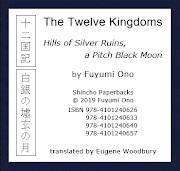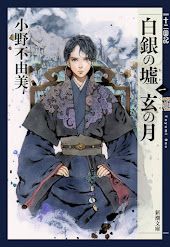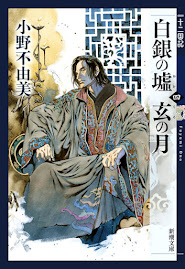Kate: Hills of Silver Ruins is the most recent novel in The Twelve Kingdoms Series by Ono Fuyumi. You have translated many of the others and are now working on the long-anticipated Hills of Silver Ruins.
Does the book seem a culmination to the series?
Does it include recurring themes?
Eugene: Hills of Silver Ruins is Fuyumi Ono's first Twelve Kingdoms novel since 2001, though she published a collection of short stories in 2013 that take place in the Twelve Kingdoms universe. Her previous novel, Zan'e in 2012, is in the contemporary horror genre (the other half of her oeuvre). Hills of Silver Ruins is a sequel to The Shore in Twilight.
Although Youko is the featured character that springs to mind, Taiki has actually commanded as much or more of her attention over the series. The epic Hills of Silver Ruins does feel like her swan song, though along with Hayao Miyazaki (whose absolutely, positively last film, How Do You Live? opens next summer), I wouldn't count out another installment down the road.
Rousan appears to be carrying out an experiment that Shouryuu (the Imperial En) once mused about when he contemplated what he would do if he got bored with being emperor (since to abdicate is to die). What would happen if he threw a wrench into the gears of that mechanical universe? Would it self-correct and how? The conclusion (so far) is that the universe of the Twelve Kingdoms does indeed self-correct while making the maximum allowances for human agency.
In fact, Ono often inveighs against legalism as a basis for both life and political governance, which brings up the other theme: the difference between reigning and ruling.
Asen was so hellbent on reigning that he gave little thought to actually ruling (and he was a nihilist going in). I wonder if Ono was thinking of Ying Zheng, the brutal king of Qin, when she created Asen. I'm pretty sure Ying Zheng was an inspiration for Shoukei's father (the assassinated emperor of Hou) at the beginning of A Thousand Leagues of Wind.
The most successful kingdoms are those where the emperor or empress reigns but doesn't try to run everything themselves or try to fix everything all at once. This was a major problem at the onset of the Meiji era. There's no disputing the need for reform but the ruling oligarchy moved so fast they triggered numerous revolts, culminating in the Satsuma Rebellion, that could easily have been avoided.
Gyousou fell into the same trap and even sent Taiki abroad so he could act with fewer checks and balances.
By contrast, Shouryuu once appointed a man to be province lord who was "so busily engaged in pilfering the public treasury he had no interest in plotting political conspiracies or leading insurrections." Because a greedy rich man worries him less than a Machiavellian interested in power for its own sake. Such lowly passions are easier to control with carrots and sticks.
Kate: After multiple translated books and manga, do you find the translation process harder? Easier?
Eugene: I'm considerably better as a translator than I was when I started out but Fuyumi Ono doesn't make it easy with her extensive use of Chinese and references to medieval Chinese culture. Vocabulary aside, she has a clear and comprehensible style. I usually read about half a dozen chapters ahead. I make so many notes along the way that I have to start writing while it's fresh in my mind.



